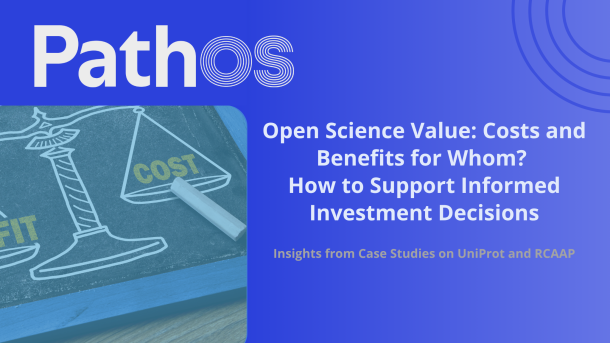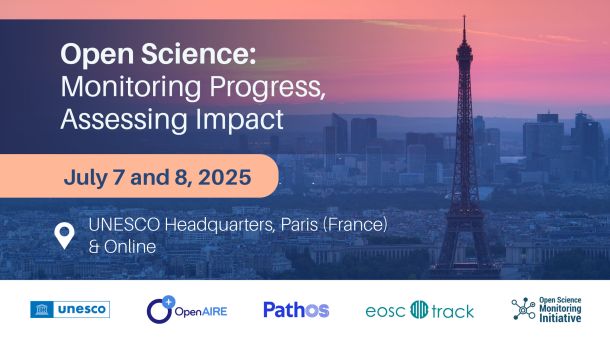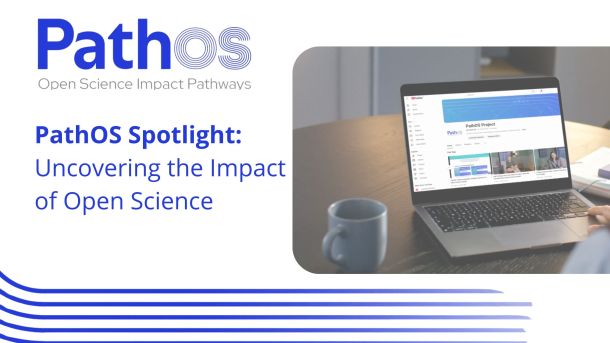PathOS co-creation community: Insights from our Focus Groups

In its first year, PathOS has launched a co-creation community, the nucleus of our project’s knowledge-sharing, and has successfully conducted three expert focus groups. These gatherings aimed not only to harness the insights of Open Science experts but also to steer the trajectory of our project's initiatives and outcomes. Through its selected case studies, PathOS aspires to bring forth the intricate dynamics between Open Science and its multi-dimensional impact on academia, industry, and policy-making. These studies are pivotal, serving as the tangible markers to discern the real-world implications of Open Science and to shape responsive strategies.
Accelerating collaborations within academia & industry
The Accelerating collaborations within academia and industry case study explores the usage of the Portuguese publication repository infrastructure for Open Science, RCAAP, to understand whether the availability of full- text open access publications increases the visibility of higher education institutions and its usage by knowledge-intensive industries and Small and Medium-sized Enterprises (SMEs), thus fostering collaborations.
Key takeaways
Case study experts agreed that the RCAAP national repository infrastructure plays a key role in disseminating the knowledge produced by higher education institutions, by making it available to all interested parties, but there seem to exist different levels of intersection between academia and industry, according to discipline and HEI. Other actors or platforms, such as co-innovation labs, may play a role in knowledge diffusion, and, besides citation analysis, this case study should also take into consideration authorship and network analysis, social impact between researchers and research centers, and patents.
Main challenges & barriers
During the focus group discussions the following challenges and barriers were identified:
- Availability of the full-text of publications – repositories many times have only the metadata available, and if not monitored, embargo periods on full-text may be longer than expected.
- Different drivers – industry’s main concern is problem-solving, so citations will need to be complemented with other types of documents and practices analysis.
- Metadata quality – the implementation of personal identifiers and in-kind APIs in repositories.
Cross cutting effects due to Open Research data from National Repository
This case study investigates two effects related to data availability: whether data availability increases uptake or usage, and whether this is different in national repositories compared to other ways of sharing data. We will study the data repository EASY, which is maintained by DANS in the Netherlands. This is a data repository that contains mostly datasets from the SSH, with a focus on the Netherlands. We initially thought of using citations to datasets to study their usage, and try to estimate the causal effect of sharing those data in a particular repository.
Key takeaways
The first focus group examined factors influencing data-seeking behaviors in social sciences and humanities. Discussions covered data reuse impact, journal reputation, field of study, and repository quality. Disciplines differ in data infrastructures—social sciences and humanities often rely on surveys and qualitative data with privacy concerns, while data reuse of the latter typically receives less attention. Data is often stored on personal computers, requiring active researcher involvement due to limited repository entries. Privacy and ethics are paramount, advocating for transparent data usage and informed consent. Data reuse in teaching and citation practices vary across fields, and citations to datasets are presumably relatively scarce. As an alternative, it was suggested to extract mentions of datasets based on textual analysis of articles.
Main challenges & barriers
- Diverse Data Infrastructures: Different disciplines have varying data infrastructures, making it challenging to establish standardized metrics and measurements across fields.
- Limited Data Repository Participation: Data is often stored on individual researchers' computers or personal websites, and not all data finds its way into repositories, hindering comprehensive measurement efforts.
- Diverse Data Reuse Practices: Data reuse takes various forms and is not easily categorized, ranging from teaching applications to new research studies. Developing standardized metrics for such diverse practices is a complex undertaking.
- Language and Data Availability: Language plays a significant role in data availability, especially in the SSH, with English-centered resources being more centralized, while data in other languages scattered across various platforms, complicating data usage measurement.
- Privacy and Ethics Concerns: Sharing data while respecting privacy and ethical considerations is a delicate balance, requiring careful attention to transparency and informed consent.
Innovation from open Research resources
The bioinfomatics case study looks at how Small and Medium-sized Enterprises (SMEs) create innovative added-value products and services while using open bioinformatics resources such as databases, software, tools, workflows, standards, ontologies, cloud computing, which are operated by ELIXIR, a public-funded research infrastructure. PathOS aims to unravel impact pathways and shed light on the effect of ELIXIR’s activities on fostering innovation in the industry sector, and how this then translates to socioeconomic and societal benefits.
Key takeaways
Representatives from academia, industry, and ELIXIR resource providers collaboratively shaped the focus group's direction. They emphasized viewing the resource ecosystem holistically, as complex resource combinations enhance product development. Another main takeaway of the discussion was the importance of considering movements of skilled personnel from resource provider to industry roles, and how much their skillset is valued by industry due to the complexity of using public research data and other resources. Participants recommended a blend of qualitative and quantitative methods for investigating signals effectively. The focus group meeting ensured co-creation of questions and methods pertinent to the case study, fostering insightful takeaways for PathOS.
Main challenges & barriers
Identified challenges were linked to :
- Unravelling complex pathways to which many contribute, for example, when proprietary data are mixed with public research data
- Innovation takes time - participants encouraged PathOS to continue speaking to industry to really understand how they use and repurpose ELIXIR resources, including at what part of the value chain.
Stay tuned with PathOS updates
Written by
Latest Articles

Open Science Value: Costs and Benefits for Whom? How to Support Informed Investment Decisions

Press Release: Conference on Open Science: Monitoring Progress, Assessing Impact
